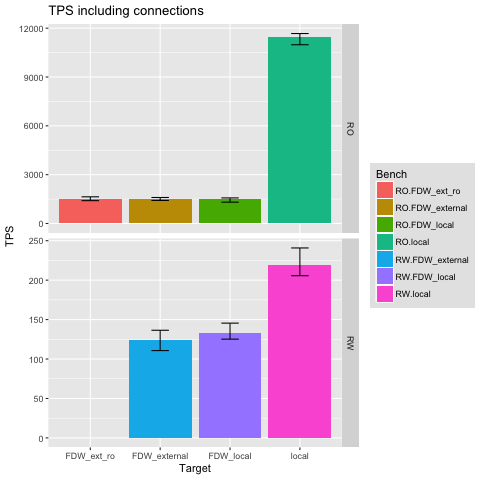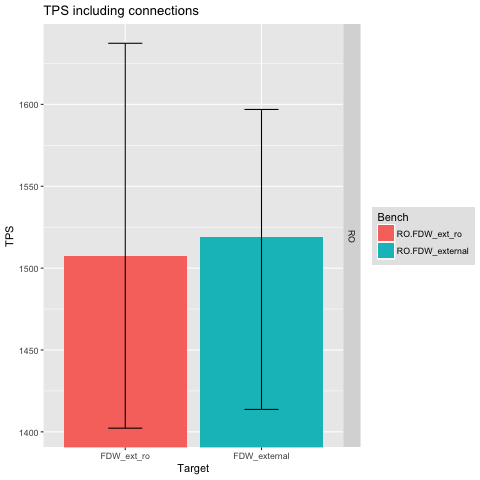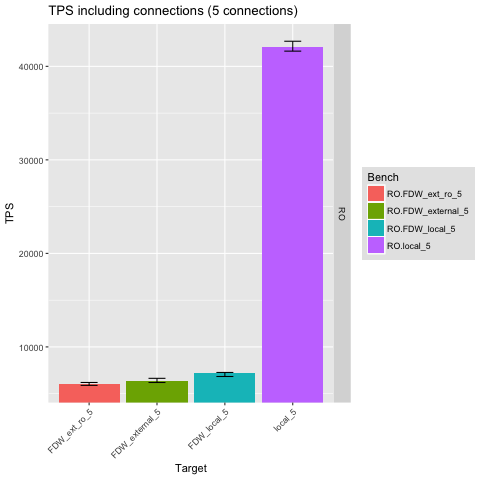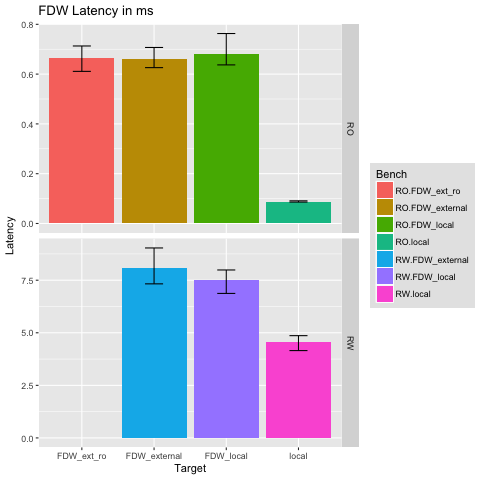


The current benchmarks were run under PostgreSQL 9.6.2, in order to persuit an estimation of the overhead of the postgres_fdw extension. For doing so I’d set four databases in two different schemas in which source is the only databases storing pgbench’s the data. Rest of the databases only hold the DDL of the foreign tables. Both instances reside on the same machine in order to discard any network biasing on the final results. One of the FDW connects from the same instance (FDW_local) and the others from a different instance (FDW_external and FDW_ext_ro), description at the reference anex.
Keep also in mind, that pgbench does intensive transaction workload, which generally is not well suitable for foreign tables. So, the overhead is something expected at this point.
From the tests taken, postgres_fdw show approximately a .70x of overhead compared with a local table. Although, for read only transactions the overhead is much higher, probably due to the effects of the forced transaction isolation used ( repeatable read ) on FDW as detalied in FDW F.33.3. For this reason, all the conducted tests have been done using REPEATABLE READ isolation, to make comparison fair (specially for read only workloads, wether more scans are needed for keeping result consistency)
Also, I considered the TPS stats including connections, as we are trying to consider all the execution phases. It is important to note that postgres_fdw recycles connections over the same session for each user mapping.
The overhead for intensive read only workloads is significantly higher than RW: 6.5x.
By executing FDW locally and externally, I observed that the external FDW had more unstable TPS throughput, allthough the mean does not show a significant difference. In fact, through all the benchmarks I’ve done, there is a slightly more throughput in the TPS mean when using FDW on a different instance over using the FDW locally.

updatable does not help at perfomance, as it only adds slightly more overhead due the permissions check. RO.FDW_ext_ro adds the options shown at [Snippet 2] to each FDW table.
With 1 connection for RO.

With 5 connections for RO connections over all the tests:

Note
Looks like FDW have a roof in terms of performance for concurrent sessions. This probably need a more intensive benchmark which could be analyzed in a second part of this post.
Is not a surprise to see a correlation when looking at the latency in milliseconds. This can be seen clearly of the [Fig.2].

TPS by RO and RW:
> subset(byBenchTPS, Type == "RO")
Bench Type Target Max Min Mean
1 RO.FDW_ext_ro RO FDW_ext_ro 1637.314 1402.255 1507.400
2 RO.FDW_external RO FDW_external 1596.900 1413.704 1519.091
3 RO.FDW_local RO FDW_local 1570.985 1310.034 1476.397
4 RO.local RO local 11670.858 10981.858 11475.249
>subset(byBenchTPS, Type == "RW")
Bench Type Target Max Min Mean
1 RW.FDW_external RW FDW_external 136.4827 110.6894 124.5781
2 RW.FDW_local RW FDW_local 145.5167 125.2096 133.1675
3 RW.local RW local 240.8039 205.6248 219.2062
Populating pgbench tables within a scale of 100:
/usr/lib/postgresql/9.6/bin/pgbench -p5434 -i -s100 source
Creating the schema on the databases from which the FDW are called (external, external_ro and localfdw):
[Snippet 1]
CREATED SERVER source_server FOREIGN DATA WRAPPER postgres_fdw
OPTIONS (host '127.0.0.1', port '5434', dbname 'source');
CREATED USER MAPPING FOR postgres SERVER source_server OPTIONS(user 'postgres');
-- New 9.6 feature!
IMPORT FOREIGN SCHEMA public LIMIT TO (pgbench_accounts,pgbench_history,pgbench_branches,pgbench_tellers) FROM SERVER source_server INTO public ;
[Snippet 2] applied into external_ro database
ALTER FOREIGN TABLE pgbench_account OPTIONS (updatable 'false');
ALTER FOREIGN TABLE pgbench_branches OPTIONS (updatable 'false');
ALTER FOREIGN TABLE pgbench_history OPTIONS (updatable 'false');
ALTER FOREIGN TABLE pgbench_history OPTIONS (updatable 'false');
Automating benchmarks and putting everything into CSV (Latency Average, TPS including connections and TPS excluding connections):
PGBENCHBIN="/usr/lib/postgresql/9.6/bin/pgbench"
PGVACUUM="/usr/lib/postgresql/bin/vacuumdb -p5434 source"
$PGVACUUM
{ for i in $(seq 1 10) ; do $PGBENCHBIN -p5434 -n -T10 source | grep -Po '= \K[\d]+\.[\d]+' | paste -sd "," - ;done } > benchRW.local
$PGVACUUM
{ for i in $(seq 1 10) ; do $PGBENCHBIN -p5434 -n -T10 localfdw | grep -Po '= \K[\d]+\.[\d]+' | paste -sd "," - ;done } > benchRW.FDW_local
$PGVACUUM
{ for i in $(seq 1 10) ; do $PGBENCHBIN -p5435 -n -T10 external | grep -Po '= \K[\d]+\.[\d]+' | paste -sd "," - ;done } > benchRW.FDW_external
{ for i in $(seq 1 10) ; do $PGBENCHBIN -p5434 -Sn -T10 source | grep -Po '= \K[\d]+\.[\d]+' | paste -sd "," - ;done } > benchRO.local
{ for i in $(seq 1 10) ; do $PGBENCHBIN -p5434 -Sn -T10 localfdw | grep -Po '= \K[\d]+\.[\d]+' | paste -sd "," - ;done } > benchRO.FDW_local
{ for i in $(seq 1 10) ; do $PGBENCHBIN -p5435 -Sn -T10 external | grep -Po '= \K[\d]+\.[\d]+' | paste -sd "," - ;done } > benchRO.FDW_external
{ for i in $(seq 1 10) ; do $PGBENCHBIN -p5435 -Sn -T10 external_ro | grep -Po '= \K[\d]+\.[\d]+' | paste -sd "," - ;done } > benchRW.FDW_ext_ro
{ for i in $(seq 1 10) ; do $PGBENCHBIN -p5434 -Sn -c5 -T10 source | grep -Po '= \K[\d]+\.[\d]+' | paste -sd "," - ;done } > benchRO.local_5
{ for i in $(seq 1 10) ; do $PGBENCHBIN -p5434 -Sn -c5 -T10 localfdw | grep -Po '= \K[\d]+\.[\d]+' | paste -sd "," - ;done } > benchRO.FDW_local_5
{ for i in $(seq 1 10) ; do $PGBENCHBIN -p5435 -Sn -c5 -T10 external | grep -Po '= \K[\d]+\.[\d]+' | paste -sd "," - ;done } > benchRW.FDW_external_5
{ for i in $(seq 1 10) ; do $PGBENCHBIN -p5435 -Sn -c5 -T10 external_ro | grep -Po '= \K[\d]+\.[\d]+' | paste -sd "," - ;done } > benchRO.FDW_ext_ro_5
Hope you enjoyed the article!